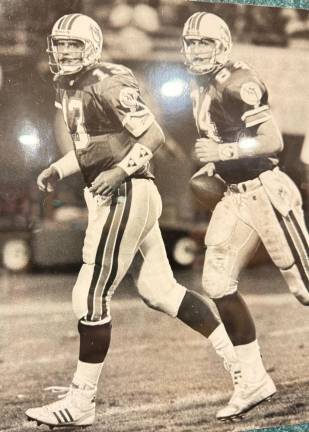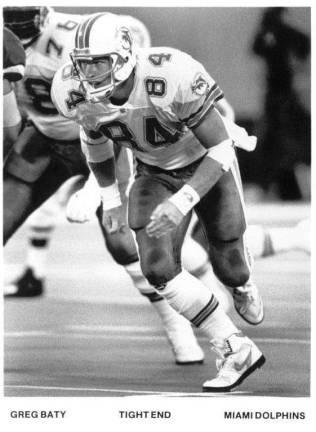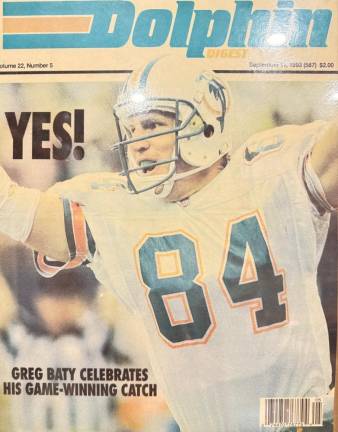


The dream of practically every boy who plays football is to make it in the NFL. Greg Baty of Sparta lived the dream for nine years.
He grew up in Sparta and went to Stanford. He spent most of his time with the New England Patriots and Miami Dolphins and experienced stints with the Rams, 49ers, Cardinals, Giants and Buccaneers. He was a tight end and at times was the long snapper on punts or kicks.
Having the good fortune to interview him, I asked if he received the ball from any notable passers.
“Yes, I caught passes from four NFL Hall of Famers: John Elway when at Stanford, Steve Young, Joe Montana and Dan Marino for five years when with the Dolphins,” he said. (I guess that was a good question to ask!)
I recall watching him strong-arm Jets great Mark Gasteneau at Giants Stadium. Greg played on the same Sparta team as our son, Mike Wells, along with Scott McLester, Brady Rymer, Louie Seville, Art Walters and, of course, many more. Mike and I would go see Greg whenever he was playing locally.
As this is a history column, it is appropriate to identify standout people from Sussex County. In this case, it is an athlete with significant ability who used that ability for accomplishments in the highest reaches of his profession.
How did he become such a standout? What could help us understand how a great oak could grow in our local soils?
Greg is built for the job: 6 foot 6 inches and 260 pounds or so. He has the strength and body composition to perform the great tasks required of an NFL tight end. But it takes more, much more. And this portion of his makeup is hard to identify, fathom and measure.
Community was extremely important, Greg said. In Sparta, there were youth sports, CYO basketball, travel basketball, Little League and youth football.
The Milk Bowl between Sparta’s two teams, the Warriors and Red Devils, played on Ungermann Field, drew, as Greg recalls, many local people, including parents, teachers, and interested and supportive folks.
The community volunteer coaches made a big impact. An important starting point for Greg was his uncle who coached him in kindergarten and spent valuable time with him when that uncle was in college. The uncle inculcated in him the idea of hard work and development of athletic skills. He said to Greg, even at that young age, that he was going to make it in the big leagues. And Greg remembers that.
And Greg always credits his dad for making sure he gave 110 percent and outworked his opponents.
High school football was important and still is. Greg fed off the energy of Sparta’s rivals. The school wanted to be the best, and this included in academics, and many people came out to the games to watch and support.
What about a big school like Stanford and Division I ball? Greg said Sparta High prepared him well, gave him confidence to be successful in what he did. As he recalls, there was only one AP course and it would have helped if there were more. He felt a special feeling, a tribute, to “Prof A” or Professor Amend, who was a college professor but also wanted to teach at the high school level. Mike had also mentioned Amend’s influence.
Greg is grateful for having learned and worked on many skills, some of these in basketball. Practice and repetition, conditioning and perseverance, determination and optimism helped him fit in at the big college level. These are characteristics of a winner that Greg wanted to impart on those still in high school as ways to prepare for the future.
He said very few will make it to the NFL, but all should - as he did - just dream to be the best at the next level whatever that may be. Understand what talents and body you have and make the best of it.
Greg was built to play tight end; he had the long lanky body type. But he was recruited mostly as a defensive end because Sparta didn’t throw the ball much back in his days as a Spartan.
He didn’t want to gain a lot of weight to play collegiate football. He believes many football injuries occur because players gain more weight than their ligaments and joints can handle.
So college coaches traveled to Sparta to watch Greg play basketball to see he had the skills to play tight end in college. And it seemed to work well, as Greg played nine years in the NFL and escaped without any major injuries.
Athletics is as important as academics, he said. Play sports, learn on the field, experience teamwork and accountability, and use sports to aid you (not let sports use you). A lot of “making it” may look to be getting your word out, but Greg feels that today it is easier to be discovered. If you are good enough, they will find you. Don’t take the easy way in life, work hard and be the best you can be with your talents. Stay healthy your whole life.
Nearing the end of our interview, Greg seemed to take a breath. “And my coaches at Sparta,” he said. The head coach was Ron Earl, and Greg was earnestly appreciative of Teddy Barbato. “But really, behind the scenes, was Dick Cassels.” Cassels had moved out of coaching and into the office, but he saw how Greg carried himself, how he played football and also was skilled in basketball. Cassels said to New Jersey leaders that Greg was a top athlete at the state level and this helped bring recruiters to watch his play in football and basketball.
Greg’s children now are out of college; all four boys played college football, Each used football to go to the best academic school they could. One played at Columbia University and was a team leader. Each used football instead of letting football use them.
He has coached Pop Warner football for 15 years and has conveyed the life lessons that football can teach you to yet another generation of kids.
Sparta’s standout is still going strong.
Contact Bill Truran, Sussex County’s historian, at billt1425@gmail.com